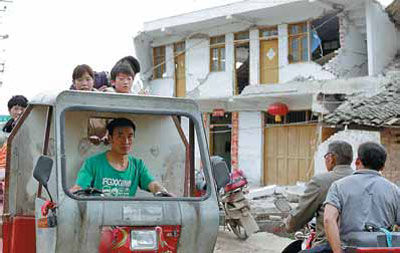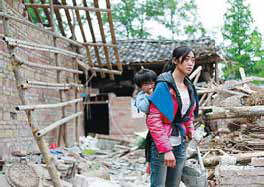Mutual help
"As the saying goes, 'Misfortune tests the sincerity of friends'. We villagers are all helping each other right now. We constructed a simple, temporary stove on some flat ground and put all the grains and water in a large pan to cook porridge. We have also been boiling water for the elderly people and kids to drink," said Chen.
"About 10 relief workers in military uniform came to our village after the quake. We really want to thank them because they helped treat the injured. Later, a number of volunteers arrived, carrying water and food. They stayed for a couple of hours to help, she added.
 |
|
Wuxing residents start a cleanup operation before any rescue teams arrive. |
"We have heard that a lot of relief workers have now arrived in the town. People say they have brought supplies as well. I hope they have enough to give some to us, because the food we have will only last one more day," she said.
Meanwhile, Yang Baixiu, 55, said her house was so badly damaged that even the strong metal door was buckled.
"We have more than 50 kilograms of rice at home, but unfortunately it's all on the top floor. The food we have is only enough for tomorrow's lunch, but maybe there are people worse off than us, and the rescue workers thought it better to help them? We just hope that, after they save those people, they will remember us. Most of the people in the village are children, women and the elderly. We can't get to the center of town to collect water and food. Please help us," she begged.
The villagers used broken doors and boards to construct a huge platform that acts as a bed for many residents.
The rescue workers also provided a large tent, the only proper one in the village. Its size means many villagers can huddle inside. The other inhabitants make do with hastily erected shelters, made out of bricks, wood and plastic sheeting, according to Yang.
"Nearly 50 people crowded into the tent to sleep, but many more have been sleeping outside. It often rains in Ya'an. Please help us by sending more tents. It would be terrible if the children and elderly residents got sick," she said.
Focus of distribution
"To avoid having all the supplies go to one place, the organizers of the disaster relief efforts will send groups of rescuers to different places to conduct a basic assessment of their requirements. The process of collecting and passing on information is crucial," said Ye Wan, a communications officer with the One Foundation, a private, charitable fundraiser.
 |
|
Hu Xia, 29, and her 2-year-old daughter at their destroyed house in Wuxing. |
"When we arrive at a disaster-stricken area, we ask the local government officials how much rice, oil and other supplies they need and send the details to our office in Chengdu, the provincial capital. In turn, the office will gather supplies from a range of sources and deliver them accordingly," Ye added.
As the rescue efforts entered a third day, the focus began to turn from heavily populated counties and towns to remote villages of just a few households.
Because a large number of medical staff and rescue teams have gathered at the site of the township government and places where no more residents need to be evacuated, the main thrust of the rescue effort has now been directed toward remote, inaccessible villages, said Zheng Jingchen, president of the General Hospital of the Armed Police Forces in Beijing, who traveled to the quake zone to assume a lead role at the coordination center for relief efforts in Lushan county.
"We have pledged not to leave any blind spots. Not a single person will be left behind," he said.
At 7 am on Monday, more than 100 relief workers, divided into five groups, were dispatched to Baoxing county and the towns of Longmen, Baosheng, Taiping and Shuangshi. Their first task was to talk to local officials, discover which villages have yet to receive help from the rescue teams and then trek to them to search for survivors.
"Today (Monday) is the last day of the '72 golden hours' (the period in which relief efforts have optimum impact). If we find any survivors, they are likely to be in a critical condition. So we have made good preparations and are carrying portable defibrillators and surgical equipment," said Zheng.
Yang Renyi, president of the No 37 Hospital of the People's Liberation Army in Ya'an, led more than 30 medics on a trek from Lushan to the county town of Baoxing on Sunday. The 40-km journey took nearly 12 hours.
Having treated 59 patients at the county hospital and a further 100 at a nearby stadium that served as a transit center for victims, the relief workers moved on to a series of villages and households across the county.
"In Baoxing, the villages are dispersed over a wide area, but the county has a small population, less than 60,000 people," said Yang Renyi. "In some places, the road is clear for vehicle use, but in other places it's still blocked. Frequent landslides are hampering the rescue workers as they try to recover the roads.
"It's important to make sure the traffic runs smoothly so supplies can reach these remote places," he said, adding that more medicine, food and other aid is being transported from Lushan to Baoxing.
Peng Yining and Wu Wencong contributed to this story.
|
|
|
|
|
|
|
|
